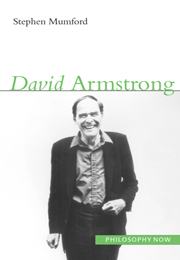11 - Necessity
Summary
In Chapters 1 to 10 we have seen Armstrong's naturalist programme develop. It forms a remarkably integrated and exceptionally consistent body of work covering the entire operations of the natural world, with some detailed attention paid to the operation of minds within that world. We might think of this body of work as the official Armstrong philosophy. It is at least the view that he has spent the majority of his career developing and extending with thorough and detailed argument. One distinguishing feature of the entire programme is the all-pervading presence of contingency. Things could have been different. Everything could have been otherwise. Even the fundamental elements of the world are contingent existents. Any necessity, such as it is, is usually classed as analytic necessity, grounded in the meaning of words rather than the nature of things, or concerns merely the internal relations of objects such as numbers.
Let us take stock and recapitulate this contingentist position. We can start with the particulars and universals. Every particular thing is a contingent existent. No particular exists of necessity. Only God, Platonic Forms and transcendent numbers were ever seriously proposed as necessary existents, but Armstrong's naturalism already rules these out. But while the idea of necessarily existing particulars has never had great intuitive appeal, many have thought that universals are necessary existents. Redness, for instance, was thought to be an eternal existent because it cannot be created or destroyed.
- Type
- Chapter
- Information
- David Armstrong , pp. 183 - 194Publisher: Acumen PublishingPrint publication year: 2007



